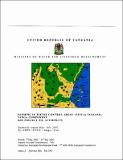Farming in tsetse control areas FITCA Tanzania Tanga component EDF project NO ACP.RPR.578..PDF

(en=English; ar=Arabic; fr=French; pt=Portuguese)
Authors
African Union Inter-African Bureau for Animal Resources
AU-IBAR
Type
ReportItem Usage Stats
112
views
views
22
downloads
downloads
Abstract
The overall objective of FITCA Tanzania is to improve the general standard of living for people
dwelling in tsetse infested areas.
The project purpose is to support existing control activities already being undertaken by populations
living in tsetse infested areas in Tanga and Kagera Region, utilizing low cost, effective and
environmentally benign techniques.
The project supports the development of affordable, manageable and effective tsetse and
trypanosomosis control methods that can be applied by the communities. Disease control is put in the
wider perspective of rural development and poverty alleviation of communities living in tsetse
infested areas.
The project duration is 36 months but for administrative reasons the initial contract period is 23
month. The Tanga Component's activities cover two of Tanga Region's six districts that are affected
by Tsetse flies, namely Handeni and Pangani.
The project area and target group are far from homogeneous, with predominantly small-scale dairy
farmers in the coastal plains and mountainous areas of the Pangani, Muheza and Tanga District and
pastoralists in the more arid areas of Handeni District. The options for tsetse / trypanosomosis control
vary between the districts, and will be evaluated together with the communities for technical and
socio-economical appropriateness